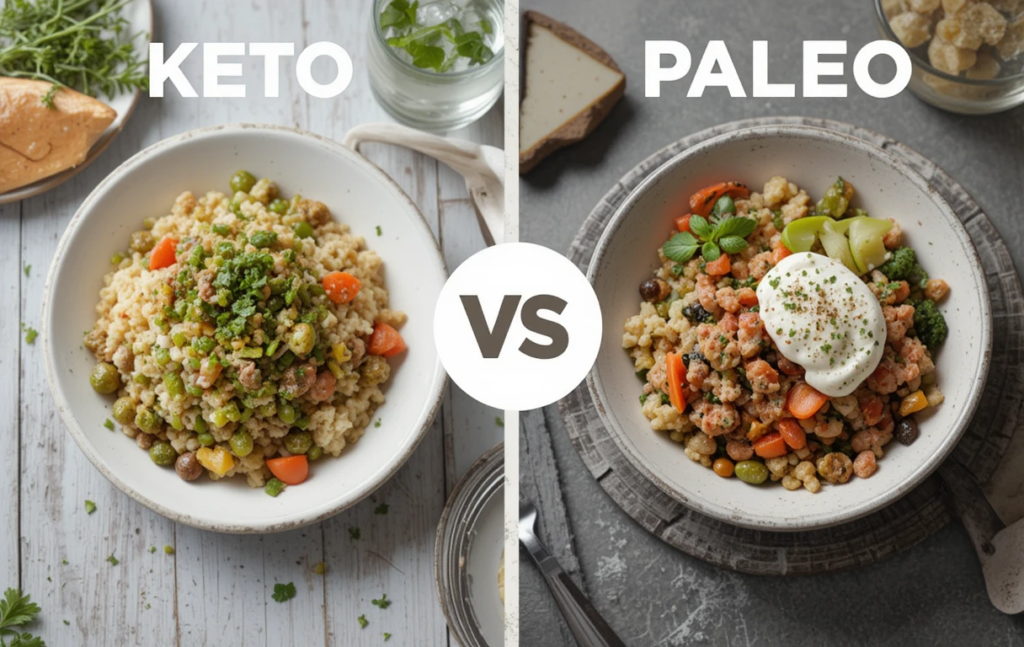Introduction
In recent years, the exploration of dietary patterns has garnered increasing attention as individuals seek effective methods to enhance their health and well-being. Among the myriad of diets available, the Keto, Paleo, and Mediterranean diets have emerged as three of the most prominent options. Each of these dietary approaches presents unique principles and purported health benefits that appeal to a diverse array of preferences and health goals.
The ketogenic diet, often referred to simply as the Keto diet, emphasizes high-fat, low-carbohydrate intake, thereby prompting the body to enter a metabolic state known as ketosis. Proponents of the Keto diet claim it can lead to significant weight loss, improved energy levels, and enhanced mental clarity. However, while the benefits can be appealing, the restrictive nature of this diet may not be suitable for everyone.

In contrast, the Paleo diet is based on the premise of consuming foods presumed to have been available to our prehistoric ancestors. This diet excludes processed foods, grains, and dairy products, focusing instead on whole foods such as lean meats, fruits, vegetables, nuts, and seeds. Advocates argue that adopting a Paleo approach can result in better digestion, weight loss, and increased energy levels. Yet, its limitations regarding certain food groups may not align with every individual’s nutritional needs.

Finally, the Mediterranean diet draws inspiration from the traditional eating habits of countries bordering the Mediterranean Sea. It emphasizes a balanced intake of fruits, vegetables, whole grains, healthy fats from olive oil, and moderate consumption of fish and poultry. Celebrated for its cardiovascular benefits, this diet promotes a sustainable and varied eating pattern, which can be more easily integrated into daily life compared to the more restrictive options.
Ultimately, selecting the best diet is a deeply personal decision, informed by individual health requirements, lifestyle preferences, and long-term sustainability. A careful consideration of these factors is essential in order to choose a dietary approach that not only promotes health but also aligns with personal well-being and lifestyle choices.
Overview of Each Diet
The Keto, Paleo, and Mediterranean diets are three popular nutritional approaches, each with distinct guidelines and health philosophies. Understanding these diets can help individuals make informed choices tailored to their health needs and lifestyle preferences.
The Keto diet, short for ketogenic, emphasizes a high-fat, low-carbohydrate intake, prompting the body to enter a state of ketosis. In this state, the body becomes efficient at burning fat for energy, as carbohydrates are drastically reduced. Typically, a keto diet consists of around 70-75% fat, 20-25% protein, and only about 5-10% carbohydrates. Originating in the 1920s as a treatment for epilepsy, the Keto diet has grown in popularity for weight loss and metabolic health.

On the other hand, the Paleo diet is based on the presumed eating patterns of ancient hunter-gatherer societies. This diet emphasizes whole foods, including lean meats, fish, fruits, vegetables, nuts, and seeds, while avoiding processed foods, grains, legumes, and dairy products. The basic principle of the Paleo diet is to consume foods that are more in line with what early humans ate, thus promoting a return to natural eating habits. Originating in the early 2000s, the Paleo movement reflects a desire to improve health by eliminating modern processed foods.

Lastly, the Mediterranean diet is inspired by eating habits in countries bordering the Mediterranean Sea, particularly Greece and Italy. This diet prioritizes whole grains, fruits, vegetables, healthy fats (especially olive oil), fish, and moderate consumption of dairy and wine. It is rich in omega-3 fatty acids and promotes balance with low intakes of red meat and processed sugars. The Mediterranean diet not only advocates for a healthy way of eating but also emphasizes social interactions and cultural aspects related to food.

Understanding these three diets—Keto, Paleo, and Mediterranean—can provide a solid foundation for individuals seeking a healthier lifestyle or weight management solutions. Each diet presents unique attributes, within various historical and cultural contexts, enabling personal adaptation based on individual preferences and health goals.
Keto Diet
The Keto diet, short for ketogenic diet, is a high-fat, low-carbohydrate nutritional approach designed to shift the body’s metabolism toward fat utilization. Typically, the macronutrient breakdown in a Keto regimen consists of approximately 70-75% fats, 20-25% proteins, and a mere 5-10% carbohydrates. This radical alteration in macronutrient ratios prompts the body to enter a metabolic state known as ketosis, where it burns fat for energy instead of glucose derived from carbohydrates.
For many individuals, the key motivation for adopting a Keto diet is fat loss. By significantly reducing carbohydrate intake, which is the primary fuel source for the body, insulin levels decrease. This hormonal shift allows the body to utilize stored fat more effectively, leading to potential weight loss results. Additionally, numerous individuals report enhanced mental clarity and reduced hunger levels while following this dietary plan, attributes often associated with ketosis.

However, despite its touted benefits, the Keto diet is not without its misconceptions. A common myth is that it promotes unhealthy eating habits due to the high fat content. In reality, a healthy Keto diet embraces sources of beneficial fats, such as avocados, nuts, seeds, and fatty fish, while avoiding artificial trans fats and unhealthy oils. Another factor to consider is long-term sustainability; some individuals find adhering to such a restrictive regimen challenging over time. A cycle of strict adherence followed by binge eating can undermine the potential benefits of the Keto diet.
Furthermore, the variety of foods that can be consumed on a Keto diet includes leafy greens, non-starchy vegetables, dairy, meats, and healthy fats, which provide essential nutrients. Ultimately, whether the Keto diet is the best fit for an individual depends on their personal health goals, dietary preferences, and lifestyle factors. A thorough understanding of its implications is vital for anyone considering this dietary pathway.

Paleo Diet
The Paleo diet, also known as the Paleolithic or Caveman diet, is based on the idea of consuming the types of foods that our ancient ancestors would have eaten. This concept has gained popularity in recent years, appealing to those who seek a more natural approach to nutrition. By mimicking the dietary patterns of hunter-gatherers, proponents of the Paleo diet emphasize the consumption of whole, unprocessed foods, discounting modern agricultural products that are believed to contribute to various health issues.
Foods that are typically allowed in the Paleo diet include lean meats, fish, eggs, vegetables, fruits, nuts, and seeds. These foods are rich in essential nutrients, high in fiber, and low in refined sugars and grains. The rationale behind this diet is rooted in evolutionary biology, positing that the human body is better adapted to digest and thrive on these natural foods rather than processed or refined alternatives. This approach is thought to minimize the risk of chronic diseases linked to modern diets, such as obesity, heart disease, and diabetes.

Supporters of the Paleo lifestyle often point to various health benefits associated with this way of eating, including weight loss, improved metabolic health, increased energy levels, and enhanced overall well-being. Some studies suggest that adhering to a Paleo diet may lead to better blood sugar control, reduced inflammation, and improved cholesterol levels. However, it is essential to recognize that the diet also faces criticisms. Detractors argue that it may be overly restrictive, leading to potential nutrient deficiencies, particularly in calcium and vitamin D from dairy products, which are excluded in this eating plan.
Overall, the Paleo diet presents a compelling counter-narrative to conventional dietary guidelines, emphasizing a return to simpler, more natural food sources. However, individuals considering this diet should assess their health needs and consult with a healthcare professional to ensure a balanced approach to nutrition.
Mediterranean Diet
The Mediterranean diet is widely recognized for its unyielding emphasis on nourishing, plant-based foods, healthy fats, and moderate consumption of dairy and meats. Originating from the traditional eating habits of countries bordering the Mediterranean Sea, this dietary pattern encourages an abundance of fruits, vegetables, whole grains, legumes, and nuts. The centerpiece of this cuisine is the use of olive oil as the primary fat source, which is rich in monounsaturated fats known for their cardiovascular benefits. This diet minimizes processed foods and prioritizes fresh, whole ingredients to promote a healthier lifestyle.
A hallmark of the Mediterranean diet is its flexibility and enjoyment of food as a vital aspect of daily life. Meals are often enjoyed with family and friends, underscoring the importance of social connection along with nutrition. This shared experience enhances the overall approach to well-being, making it more than just a strict eating regimen but a culturally rich lifestyle. The emphasis on physical activity, consuming meals mindfully, and building strong relationships contribute to the balanced and holistic nature of this diet.

Research has consistently demonstrated the numerous health benefits associated with the Mediterranean diet. Studies have shown that adherence to this dietary pattern is linked to improved heart health, reduced risk of chronic diseases, and even enhanced longevity. The diet’s focus on omega-3 fatty acids, antioxidants, and fiber plays a pivotal role in promoting cardiovascular health and maintaining a healthy weight. The Mediterranean diet has also been connected to improved cognitive function and a decreased likelihood of developing neurodegenerative diseases.
Ultimately, the Mediterranean diet’s emphasis on balanced eating, incorporating a variety of nutrient-dense foods, and fostering community around meals positions it as a sustainable and health-conscious option. By choosing to adopt this diet, individuals may experience enhanced quality of life, making it a compelling choice for those seeking long-term health benefits.
Key Differences Between the Diets
The Keto, Paleo, and Mediterranean diets each have unique characteristics that set them apart, influencing their dietary approaches, food selections, and health impacts. Understanding these differences can help individuals determine which diet may be best suited to their lifestyles and health goals.
Starting with the Keto diet, this high-fat, low-carbohydrate approach aims to induce ketosis, a metabolic state where the body burns fat for fuel instead of carbohydrates. Typically, the macronutrient breakdown consists of around 70-75% fat, 20-25% protein, and only 5-10% carbohydrates. The focus on fats leads to the exclusion of most grains, sugars, fruits, and starchy vegetables. The primary philosophy behind Keto is to minimize insulin levels to promote fat burning.

In contrast, the Paleo diet emphasizes whole foods that could have been consumed by our ancestors during the Paleolithic era. This diet encourages the consumption of lean meats, fish, fruits, vegetables, nuts, and seeds while excluding processed foods, grains, legumes, dairy, and refined sugars. The macronutrient ratios can vary significantly depending on individual preferences, but it typically leans towards a higher protein intake compared to Keto. The guiding principle of the Paleo approach is to eat foods that are minimally processed and close to their natural state.

The Mediterranean diet, rooted in the traditional eating patterns of countries bordering the Mediterranean Sea, prioritizes plant-based foods, healthy fats (particularly olive oil), whole grains, fish, and lean proteins like chicken. This diet promotes a balanced macronutrient distribution, typically comprising 40-50% carbohydrates, 30% fats, and 20-30% protein. With a focus on food quality and sustainability, the Mediterranean philosophy emphasizes the health benefits of lifestyle factors such as social eating, making it more of an all-encompassing health strategy rather than just a diet.
In summary, while the Keto, Paleo, and Mediterranean diets can promote health benefits, their differing food choices and macronutrient distributions cater to various dietary preferences and health objectives. Understanding these distinctions is essential for individuals to choose the dietary approach that aligns with their needs.
Pros and Cons of Each Diet
When considering dietary patterns, understanding the advantages and disadvantages of the Keto, Paleo, and Mediterranean diets can significantly influence individual choices. Each diet presents distinct characteristics that cater to different lifestyle needs and health objectives.
The Keto diet, known for its low carbohydrate and high-fat intake, can promote rapid weight loss and improved insulin sensitivity. The state of ketosis that this diet induces may lead to heightened mental clarity and reduced hunger. However, a significant drawback is its restrictive nature, which can make it challenging to maintain over the long term. Additionally, potential side effects such as the “keto flu,” constipation, and nutrient deficiencies should not be overlooked. Nutritional balance can be compromised if not carefully managed.

In contrast, the Paleo diet emphasizes whole foods and eliminates processed items, grains, and legumes. This dietary approach can lead to improved overall nutrition and weight management due to its focus on high-quality proteins, vegetables, and fruits. Many advocates suggest that the Paleo diet fosters a healthier relationship with food. However, critics point to the elimination of entire food groups, which may restrict essential vitamins and minerals, making adherence difficult for some individuals. The lack of scientific consensus on its health benefits remains a concern for those evaluating its long-term efficacy.

The Mediterranean diet, characterized by a balance of healthy fats, lean proteins, whole grains, and plenty of fruits and vegetables, has shown substantial health benefits backed by research. It has been linked to a lower risk of heart disease, obesity, and other chronic conditions. The flexibility and variety it offers can lead to greater adherence over time. However, the potential downsides may include the necessity for meal preparation and the potential for higher costs associated with fresh foods.

An informed decision regarding these diets requires careful consideration of personal preferences, health goals, and any existing medical conditions.
Factors to Consider When Choosing a Diet
Choosing the right diet is a significant decision that can profoundly impact one’s overall health and well-being. Several factors should be evaluated before committing to a specific dietary plan. First and foremost, personal health goals should be clearly defined. Are you aiming for weight loss, muscle gain, improved cardiovascular health, or perhaps better digestive function? Understanding these objectives will guide the selection process towards a diet that aligns with your overarching health aspirations.

Another critical factor to consider is existing medical conditions. For instance, individuals with diabetes may require a carbohydrate-restricted diet, while those with hypertension might benefit from a Mediterranean approach, which emphasizes heart-healthy foods. It is essential to take into account any allergies or intolerances that could limit food choices within certain diets. Adequate awareness of one’s health status ensures that the chosen plan promotes health without posing potential risks.
Lifestyle and preferences also play a significant role in the diet selection process. A busy professional may find it challenging to adhere to a diet requiring extensive meal preparation, while someone who enjoys cooking might thrive in such an environment. Taste preferences and cultural considerations should also be acknowledged, as enjoyment of food is a crucial aspect of dietary adherence. A diet that feels like a restriction is less likely to be sustainable in the long term.

Moreover, consulting with healthcare providers or nutritionists before embarking on a new dietary journey is highly advisable. These professionals can provide personalized recommendations based on individual health profiles and lifestyle considerations, ensuring that the chosen diet is both effective and safe. Informed guidance can facilitate enacting dietary changes that promote long-lasting health benefits.
Conclusion
In the exploration of dietary options, we have examined three prominent diets: the Keto, Paleo, and Mediterranean. Each of these nutritional approaches offers unique benefits and presents specific challenges. The Keto diet, known for its low carbohydrate intake, promotes ketosis, which helps in fat burning and weight loss. However, the restrictive nature of this diet may not be sustainable for everyone, as it limits certain food groups that are integral to a balanced diet.
Conversely, the Paleo diet encourages whole foods based on ancestral eating, eliminating processed foods, grains, and dairy. This diet highlights natural sources of nutrition, which can lead to improved health. Yet, similar to Keto, it may not suit individuals with varied dietary needs or preferences, particularly those who rely on dairy and grains for energy.
The Mediterranean diet stands out with its emphasis on variety and moderation. Incorporating an abundance of fruits, vegetables, whole grains, nuts, seeds, and healthy fats, it has been widely praised for its long-term health benefits, including heart health and reduced inflammatory conditions. This diet tends to be more adaptable and sustainable compared to the highly restrictive nature of the other two diets.
Ultimately, determining the best diet is highly personal and should reflect one’s individual health goals, lifestyle, and preferences. There is no one-size-fits-all answer, as what works for one person may not work for another. It is advisable for individuals to consider consulting with healthcare professionals or nutritionists when making dietary decisions, ensuring they choose an option that aligns well with their health objectives and enhances their overall well-being.

